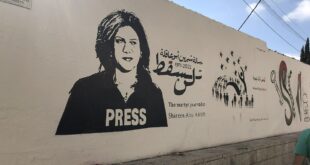
In his State of the Union address in January 2004, US president George W. Bush heralded the solution-a US Congress-financed Arabic-language satellite television channel called Alhurra ("The Free"), and it was launched in early February 2004.
President Bush introduced Alhurra with the words "to cut through the hateful propaganda, the Voice of America and other broadcast services are expanding their programming in Arabic and Persian-and soon a new television station will begin providing reliable news and information across the region."
Alhurra broadcasts via two state-owned Arab satellites, Arabsat and Nilesat. It complements its sister music and news-based Radio Sawa ("Radio Together"), launched in spring 2001, which is now part of the local radio scene of many Arab cities.
Both Arab-state-owned satellites grant Alhurra 90% reach in the Arab Gulf region, 10-15% in Iraq, over 50% in Jordan, Lebanon and Syria, just over 10% in Egypt, and over two-thirds of the homes across the Maghrib region. But with this promising reach a number of questions need to be tackled in order to be able to convert potential into actual viewership, let alone changing the minds and the hearts of the Arabs.
How valid is the Bush Administration's argument that the US perspective, if it reaches Arab masses at all through the Arab media, reaches them distorted? Is this claim based on the new Arab media realities that have been evolving since the sprawling of pan-Arab satellite TV in the 1990s? Or based on a premise that belongs to a previous media era of a single Arab media environment? How well aware is the US administration informed about the new realities taking shape across the Arab regional TV scene?
Incidentally, a similar question can be asked of the Arab media itself: why is it that in the US mind it only conjures images of hate, bias, and antagonism towards the US?
It is time for both, the US and the Arabs to put an end their intellectual laziness and start searching for new answers rather than simply continuing to pull out answers generated decades ago, and which justify their mutual failure to communicate.
To a researcher on developments in the Arab media scene, it is intriguing to observe how miserably the US administration has failed in realizing the opportunities the pan-Arab satellite media made available to the official US political perspective-even on Al Jazeera, allegedly the leading manufacturer of hatred towards the US.
Starting with the CNN's coverage of 1990-1991 war to liberate Kuwait, this presence of US media content continues to take wider dimensions with every major regional or international event that has origins in the Arab world. Thanks to the rapid growth to access to pan-Arab satellite television, expansion of the presence of US media across the Arab world has been showing exponential growth since the 9/11 attacks on the US.
Since 9/11, all major pan-Arab satellite channels have carried live practically every news conference or speech held or made by President Bush, Secretaries Colin Powel and Donald Rumsfeld or spokespersons at the White House, Pentagon, State Department, CENTCOM in Qatar, or the Coalition Provisional Authority in Baghdad.
US government officials, analysts, and research experts on the region appear regularly on prime-time news and talk shows that command wide audiences across the Arab world. All major Arab satellite channels have news bureaus in Washington and regularly invite US officials and US experts to appear on their shows.
Competition for pan-Arab audiences has forced key Arab satellite channels to shed the image conjured up by the state-owned media. National political news is scarcely reported in the main news, to the extent that more US officials than government officials of the twenty-three Arab states combined appear on pan-Arab satellite TV.
One often overlooked major development is the media normalization with Israel. Israeli officials and political analysts appear regularly on prime-time news or talk shows of Arab satellite channels owned by states or individuals whose countries do not officially recognize the State of Israel.
There is however a significant difference between the way Israelis and Americans communicate with Arab audiences. Many Israeli analysts and officials communicate in fluent Arabic; sometimes to the extent that a viewer may be unable to identify them as Israelis. The Israelis may have done themselves a service in dropping their own Arabic satellite channel soon after it was launched last year.
This is not to suggest that the US's Alhurra channel in Arabic will face a similar fate to that of the Israeli Arabic-language channel, or to suggest that fluency in Arabic is a pre-requisite for effective communication. Most of the 200-strong Alhurra staff are Arab professionals drawn from different Arab media, headed by Bert Clienmen, a personal friend and a passionate friend of the different peoples of the Middle East.
Bert Clienmen has no illusion that Alhurra will be a TV channel that supports the US perspective. But he also sees it as a channel that seeks widening the perspectives of its audiences, motivates them to ask questions and supports individuality and self-empowerment rather than claiming to have monopoly over truth or to be a competitor to Al Jazeera.
The Arab masses are shying away from the Arab official media, which for long hijacked political truth. The pan-Arab satellite TV channels have freed the media, if only partially-a fact that has yet to be appreciated in the US.
Alhurra's presence on Arabsat and Nilesat is testimony that the Arab states do not block the flow the US political perspective to the Arab world, regardless of the notion held by some that the Arab states had little choice on that.
Prevailing notions in Washington give the impression that the US is better off creating its own media vehicles to reach Arabs, rather than making more effective use of existing Arab media.
The success of Alhurra will largely depend on the lessons yet to be drawn from the new and promising media dynamics created and still evolving on the pan-Arab television scene. There is little evidence that the US understands these new dynamics. With Alhurra the US has opted for the easier alternative, but this will not guarantee that its message will reach the greatest number of viewers. TBS
 Arab Media & Society The Arab Media Hub
Arab Media & Society The Arab Media Hub




